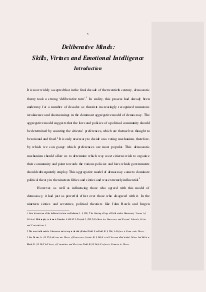Over the past two decades deliberative models of democracy have become increasingly popular. There is a growing acceptance that citizens should have the opportunity to directly shape the laws and policies that govern their lives. It is hoped that increased deliberation will not only improve the quality of political decisions being made, but also add to their legitimacy. In this thesis I will make three key claims about deliberative democracy. Firstly, I will argue that deliberative theorists pay too little attention to the role that internal deliberation plays in the deliberative process. That is, they focus too heavily on the external exchange of reasons between citizens but pay too little attention to the ways that citizens must think about issues within their own minds. They concentrate on encouraging and regulating deliberative speech and in doing so they downplay or overlook the role of individual deliberative thought. Secondly, I will argue that because they do not properly value internal deliberation alongside its external counterpart, they fail to properly consider the capacities which make it most effective. In short, there is little consideration of the internal deliberative skills and virtues, or the emotional intelligence citizens will require for internal deliberation. Thirdly, I will argue that deliberative theorists pay too little attention to the development of these capacities. They rarely discuss education and there are too many assumptions about the development of internally competent deliberative citizens. In this thesis I will identify these problems in the deliberative literature and will try to address them by defending a central role for internal deliberation. I will propose a full account of the internal deliberative capacities and will outline a developmental approach which can produce the internally competent citizens which deliberative democracy relies upon.
Deliberative Minds: Skills, Virtues and Emotional Intelligence of the Deliberative Democratic Citizen
Paper Title:
Deliberative Minds: Skills, Virtues and Emotional Intelligence of the Deliberative Democratic Citizen
Journal Title:
University of Newcastle-upon-Tyne Thesis
Published Date:
Authors:
Griffin
Abstract:




